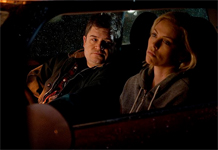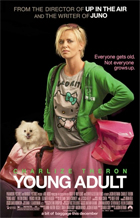Young Adult
|  Young Adult reunites director Jason Reitman and screenwriter Diablo Cody, who previously collaborated on Juno (2007), a hilariously humane comedy about teenage pregnancy that secured Reitman’s filmmaking chops and put Cody on the map (and won her an Oscar to boot). Thus, it shouldn’t be surprising that there is a great deal of expectation riding on Young Adult, which stars Charlize Theron as a 37-year-old ghost writer for a popular teen book series who returns to her small, hick Minnesota hometown to win back her high school boyfriend, who is now a husband and father. There are certain similarities between the two films, particularly the way in which both are constructed around narrative arcs that demand big “messages” but ultimately reject them, but it is hard not to feel that Young Adult is something of a letdown, a step back instead of forward. Young Adult reunites director Jason Reitman and screenwriter Diablo Cody, who previously collaborated on Juno (2007), a hilariously humane comedy about teenage pregnancy that secured Reitman’s filmmaking chops and put Cody on the map (and won her an Oscar to boot). Thus, it shouldn’t be surprising that there is a great deal of expectation riding on Young Adult, which stars Charlize Theron as a 37-year-old ghost writer for a popular teen book series who returns to her small, hick Minnesota hometown to win back her high school boyfriend, who is now a husband and father. There are certain similarities between the two films, particularly the way in which both are constructed around narrative arcs that demand big “messages” but ultimately reject them, but it is hard not to feel that Young Adult is something of a letdown, a step back instead of forward.In Juno, Cody was able to create characters who were comical exaggerations, and yet still rung true. At that time Reitman was also more invested in showy indie-comedy-style visual and editing flourishes, which he had toned down to some extent from his directorial debut Thank You for Smoking (2005). Since then, Reitman has scaled back his stylistics to the point that his most recent film, Up in the Air (2008), could be described as traditional dramatic realism, albeit with plenty of ironic touches, which is the approach he takes here. Unfortunately, Cody has not met him with characters that entirely work, and in some cases behave in ways that feel utterly absurd. If Reitman has approached the material from a more cartoonish tonal and visual perspective, the film might have worked better as a whacked-out parody of arrested development, but as is it works only in fits and starts as a more aspirant satire of human desire and what it means to be “happy.” When we first meet Theron’s Mavis Gary, she is living what looks like a fairly depressing single life in Minneapolis that consists of chugging Diet Coke and writing by day in her cluttered high-rise condo and getting smashed by night with various one-night stands. Somewhere in her mind this constitutes a great existence, although you wouldn’t know it from her slouched posture and constant frown. When she receives a mass baby announcement via e-mail from her high-school ex-boyfriend Buddy Slade (Patrick Wilson), she becomes obsessed with the idea that the only thing lacking in her life is Buddy, with whom she feels she is meant to be. So, despite the fact that the final installment of Waverly Prep, the teen book series she has made her career ghost-writing, is due in a week, she packs a suitcase and heads back to her hometown of Mercury with no specific plan other than to win Buddy away from what she imagines to be a hellish existence of domestic banality with his wife Beth (Elizabeth Reaser) and newborn baby. Of course, asking the audience to identify with a remorseless home-wrecker is the film’s most overt challenge, and Young Adult takes it head-on not by turning Mavis into a comical exaggeration (as Thank You for Smoking did with Aaron Eckhart’s hyper-verbal, remorseless tobacco lobbyist), but rather by playing up her wretchedness. Mavis is a sad, sad person, and Cody gives her any number of unpleasant quirks, including obsessively pulling her hair out strand by strand and her general lack of concern for anyone including herself (which extends to her poor Pomeranian, who gets unceremoniously dumped in a motel room with a pee pad). For her part, Theron doesn’t downplay any of Mavis’s unpleasantness, and some of the film’s biggest laughs come in the form of audience disbelief (“Did she really just say that?”). As a counterbalance, Cody gives us Matt Freehauf (Patton Oswalt), a dumpy former schoolmate who Mavis doesn’t recognize despite the fact that they had lockers next to each other for four years. Matt compliments Mavis in that he is also pathetic; the difference is that he recognizes the shortcomings of his life while Mavis delusionally thinks that she has scored big. Matt also has the excuse of a literal crutch, which is the lifelong result of his being beaten by jocks in high school because they thought he was gay; thus, he is doubly humiliated in having been the victim of a hate crime that turned out to be not an actual hate crime. Matt plays the relentless superego, constantly chiding Mavis for her home-wrecking desires while she uses him as a sounding board and drinking buddy to whom she pays little mind. The set-up is there, but the pay-off doesn’t work. While Mavis is a fully formed character—her messy, often hurtful self-absorption and willful nastiness is astutely brought to life by Theron’s thoroughly lived-in performance, as is her sadness and desperation—she is surrounded by characters who make little sense (it is as if Cody spent so much creative energy getting inside Mavis’s head that she forgot to write characters around her). There is some pathos in Matt’s situation and Patton gives a credible performance, but when he shows up again and again, he feels more like a screenwriter’s tool than a flesh-and-blood human being. Similarly, Patrick Wilson’s Buddy is a maddeningly obtuse object of desire who behaves in ways that defy credibility. Is it possible that he could be so consistently clueless about Mavis’s intentions and the desirous—no, let’s say lecherous—looks she keeps throwing his way? Granted, in the last third of the film everything comes to a head at Buddy and Beth’s baby naming party when Mavis has her final meltdown for all to see and Buddy makes it clear that he’s known more than he’s ever let on, which actually makes his behavior seem reprehensible in a way (the fact that Beth is party to it is even weirder). That brings us to what is probably the film’s best sequence, which appears to be building toward a big moment of growth for Mavis, only to be surprisingly undercut in a way that works where so much else in the film didn’t, giving voice to an otherwise voiceless character and, in the process, reaffirming the film’s overall view of the relative nature of happiness. It’s not a pretty view, and certainly not one that will have you leaving the theater feeling warm and fuzzy, but it rings true in its own twisted way. Copyright ©2011 James Kendrick Thoughts? E-mail James Kendrick All images copyright © Paramount Pictures |
Overall Rating: 

 (2.5)
(2.5)


